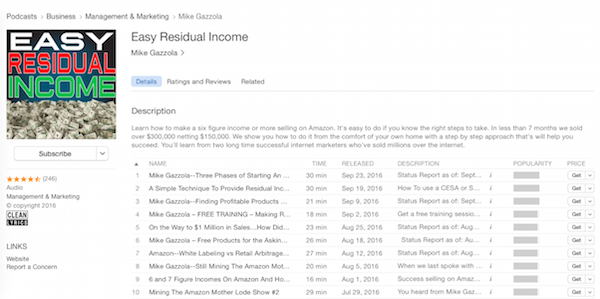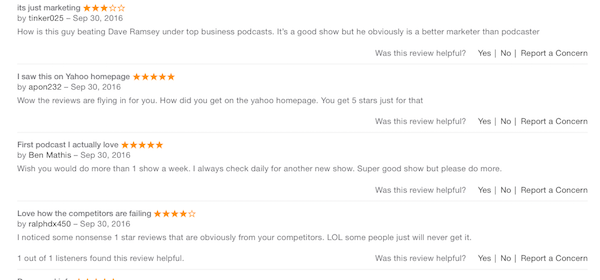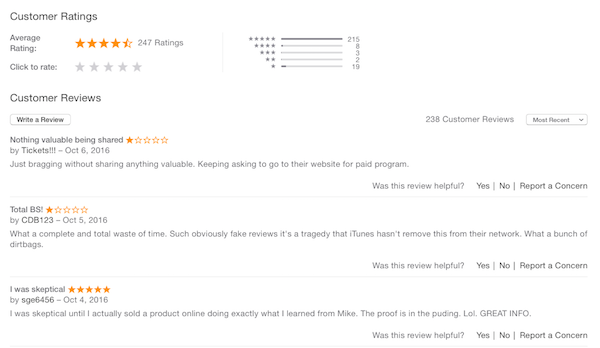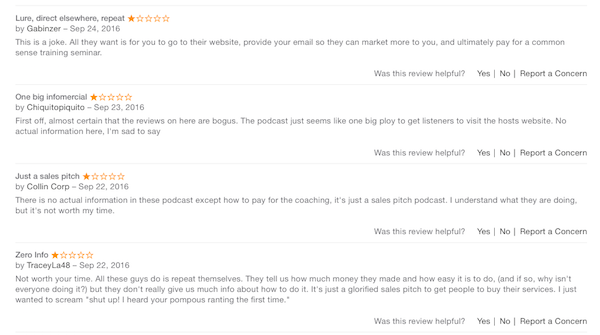Update to article!! I’ve been notified that I’ve fallen into a classic pitfall, mistaking correlation with causation. Just because the podcast mentioned in this article got bursts of reviews does not mean it contributed to the seemingly manipulated rankings, as I concluded.
Instead, it’s likely because the reviewers subscribed AND reviewed the podcast, as an influx of subscriptions is what gets your podcast ranking better in the mentioned iTunes sections, not reviews.
You can see the discussion here.
I’ve been watching the progress of the Easy Residual Income podcast that’s put out by Mike Gazzola. If you haven’t heard of it, listen up.
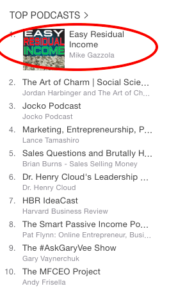
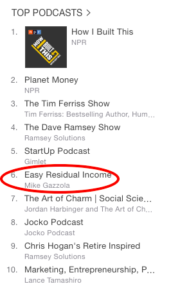 I noticed this podcast trending in the iTunes search algorithm one day, so I decided to check it out. It was listed as a top ranked podcast, among many of the other marketing podcasts that I listen to and love.
I noticed this podcast trending in the iTunes search algorithm one day, so I decided to check it out. It was listed as a top ranked podcast, among many of the other marketing podcasts that I listen to and love.
After a few minutes, I was confused. This podcast sucked! The episode was basically two guys just talking about how to make money online via drop shipping.
It was 100% clear they were just using the podcast to get people on their website and sell them some kind of course.
It sounded scammy and like a blatant infomercial. Why was this podcast trending so highly in iTunes? I decided to dig a bit deeper.
At the time I took this screenshot, the podcast had 246 reviews in iTunes and a handful of episodes. All of the episodes were centered around generating passive income online.
Don’t get me wrong, I LOVE the concept of passive income. I’m a younger guy, and I don’t have to work for a corporation because I’ve worked hard to built up multiple online assets. I’m always exploring ways to generate more passive income.
But, something didn’t seem right about this podcast. I started to look into the iTunes reviews. There were many positive reviews, and also a bunch that weren’t as positive. I’ll first include some of the positive reviews below.
Like the one reviewer above, I was also wondering how this podcast was doing better than Dave Ramsey’s in the iTunes algorithm. I then took a look at some of the negative reviews.
If you take a second to read through these reviews, many will bring up suspicions that the podcaster paid for the majority of their positive reviews. They’ll also underscore how the podcast isn’t that helpful and that the podcaster is just clearly trying to get people onto his website to sell some product. It actually surprises me that there are only 19 negative reviews at the time I took this screenshot.
So the question is, how can this podcast remain at the top of the iTunes marketplace? How is it gaming iTunes?
I noticed when looking through the reviews for this podcast that they tend to come in short bursts. For example, there are bunch of reviews from August 25 – 28, and then they stop. Then, they pick up again from Sept 8 – 12. Granted, there is a consistent inflow of reviews from August 4th, 2016 – August 16th, and a good number on August 12th and 13th.
I believe that the reason this podcast is ranking so well is due to the velocity of their reviews, meaning that they’re getting reviews in short bursts. The speed at which they are getting reviews is impacting their rankings. Also, yes, in my personal opinion, I think these reviews are fake.
So, the formula for gaming the iTunes algorithm seems to be to buy fake reviews in short bursts to increase the velocity of the reviews.
Am I going to do that?
No.
But, I might consider ASKING my audience for reviews through my email newsletter from time to time, rather than asking them consistently. This might accomplish a similar effect.

